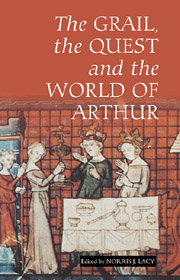Book contents
- Frontmatter
- Contents
- List of Illustrations
- Notes on Contributors
- Foreword
- Introduction: Arthur and/or the Grail
- 2 The Shape of the Grail in Medieval Art
- 3 The Crusaders' Grail
- 4 Bounds of Imagination: Grail Questing and Chivalric Colonizing in Wolfram von Eschenbach's Parzival
- 5 The Land without the Grail: A Note on Occitania, Rigaut de Barbezieux and Literary History
- 6 Female Desire and the Quest in the Icelandic Legend of Tristram and Ísodd
- 7 Questing in the Middle Dutch Lancelot Compilation
- 8 Keeping Company: Manuscript Contexts for Reading Arthurian Quest Narratives
- 9 Grail and Quest in the Medieval English World of Arthur
- 10 Malory and the Grail: The Importance of Detail
- 11 Glastonbury, the Grail-Bearer and the Sixteenth-Century Antiquaries
- 12 The Grail Quest: Where Next?
- Appendix: The Grail on Film
- Index
- Analysis of grail scenes
- Arthurian Studies
11 - Glastonbury, the Grail-Bearer and the Sixteenth-Century Antiquaries
Published online by Cambridge University Press: 05 February 2013
- Frontmatter
- Contents
- List of Illustrations
- Notes on Contributors
- Foreword
- Introduction: Arthur and/or the Grail
- 2 The Shape of the Grail in Medieval Art
- 3 The Crusaders' Grail
- 4 Bounds of Imagination: Grail Questing and Chivalric Colonizing in Wolfram von Eschenbach's Parzival
- 5 The Land without the Grail: A Note on Occitania, Rigaut de Barbezieux and Literary History
- 6 Female Desire and the Quest in the Icelandic Legend of Tristram and Ísodd
- 7 Questing in the Middle Dutch Lancelot Compilation
- 8 Keeping Company: Manuscript Contexts for Reading Arthurian Quest Narratives
- 9 Grail and Quest in the Medieval English World of Arthur
- 10 Malory and the Grail: The Importance of Detail
- 11 Glastonbury, the Grail-Bearer and the Sixteenth-Century Antiquaries
- 12 The Grail Quest: Where Next?
- Appendix: The Grail on Film
- Index
- Analysis of grail scenes
- Arthurian Studies
Summary
As its title suggests, this chapter deals with the world of the printed book, when the Arthurian story was known in England primarily through Malory's encyclopedic Morte Darthur. Although Caxton's edition of the Morte continued to be reprinted throughout the sixteenth century, the comments of Queen Elizabeth's tutor Roger Ascham in The scolemaster are representative of the mid-Tudor response to Malory. Ascham roundly condemned
Le Morte d'Arthur, the whole pleasure of which booke standeth in two speciall poyntes, in open manslaughter and bold bawdrye: in which book they are counted the noblest knights that do kill most men without any quarrel, and commit fowlest adultries by subtlest shiftes: as Sir Launcelote with the wife of King Arthur his master.
The criticism here, as befitted a schoolmaster, was a moral one. Unappealing to readers in the sixteenth century, Catholic and Protestant alike, were the literary accretions rather than the so-called historical realities that lay behind them, and it is with these latter that I shall be concerning myself in this chapter.
It has long been fashionable to maintain that the British history as most fully articulated by Geoffrey of Monmouth fell into disrepute after a brief flowering under Henry VII as a result of emerging humanist methods of research – this is a view most influentially put forward by Sidney Anglo – but recent scholarship has shown just how important the ‘Arthur of history’ was in legal and political circles throughout the sixteenth century.
- Type
- Chapter
- Information
- The Grail, the Quest, and the World of Arthur , pp. 156 - 172Publisher: Boydell & BrewerPrint publication year: 2008



